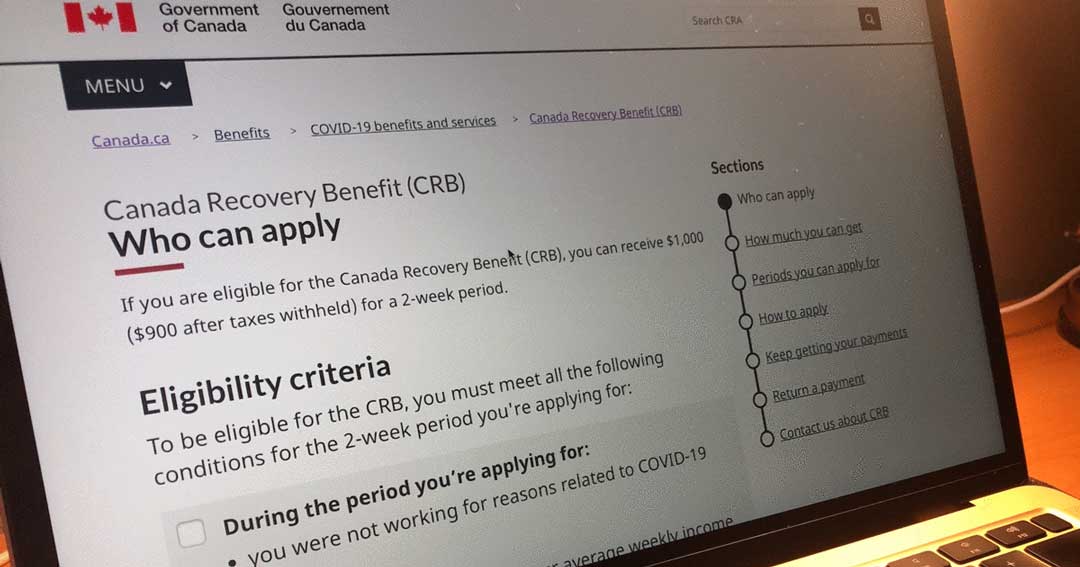
The Canada Revenue Agency (CRA) launched the Canada Emergency Response Benefit (CERB) as the flagship COVID-19 program by the Canadian government in 2020. CERB became a lifeline for Canadians who lost income due to the pandemic. The program ended on September 27, 2020, and made way for CERB replacements.
The federal government revamped the Employment Insurance (EI) system and introduced the Canada Recovery Benefit (CRB) to transition Canadians still in need of financial aid. With no visible end to the pandemic, despite hopeful developments on the vaccine front, the government announced two major updates for EI and CRB.
Maximum duration
Many CRB recipients are due to exhaust their benefits on March 27, 2021. The government’s announcement to update CRB and EI came right on time. One of the changes introduced by the CRA will be an extension of CRB from the original 26 weeks to 38 weeks. For regular EI benefits, the CRA has extended the period to 50 weeks for claims made between September 27, 2020, and September 25, 2021.
The federal government also extended the Canada Recovery Caregiving Benefit (CRCB) and Canada Recovery Sick Benefit (CRSB). The CRCB duration is also 36 weeks after the update, while the CRSB has been extended from two to four weeks.
CRA cash benefit amount
The CRA pays $1,000 for each two-week CRB eligibility period, which is actually $900 after the 10% withholding tax is deducted at the source. For self-employed individuals who prefer access to their EI benefits through Service Canada, the government has reduced the self-employed income threshold (for 2020 earnings) from $7,555 to $5,000.
You can earn income while you receive CRB, provided that your annual income for the calendar year will not go over $38,000. You will need to pay 50% of each dollar of your income that goes above $38,000.
If you qualify for the EI benefit, the minimum amount you can receive per week is $500 (subject to a 10% tax on payment), but some people may be eligible to receive up to $573 per week, depending on their previous income. The proceeds for both CRSB and CRCB are $450 per week (subject to a 10% withholding tax upon payment).
Source: CRA
Newsletters
No Results Found
The page you requested could not be found. Try refining your search, or use the navigation above to locate the post.
Events & Sponsorship
No Results Found
The page you requested could not be found. Try refining your search, or use the navigation above to locate the post.
Articles & Publications
Everything you need to know about your 2020 taxes.
As tax season begins, Canadians are faced with filing for an unprecedented year - job losses, federal financial aid, and working from home are just some of the major adjustments made over 2020. The Canada Revenue Agency (CRA) has listed all the deadlines for the 2020...
Which Accounting Method is Best for Your Business?
Accounting Methods: Which One is Best for Your Business? Every small business owner needs to decide which accounting method is best for their business. We'll explain each method and help you decide which one you should use. There are different types of accounting....
Award-Winning ADP Next Gen Payroll Platform Expands to Canada and Mexico
Market-leading cloud platform available across North America ADP is expanding its leading Next Gen Payroll Platform across North America to Canada and Mexico to help transform the payroll experience for both practitioners and employees in those markets. With...
ADP Canada National Employment Report
Employment in Canada Decreased by 28,800 Jobs in December 2020 Employment in Canada decreased by 28,800 jobs from November to December according to the December ADP® Canada National Employment Report. Broadly distributed to the public each month, free of...
Canada Emergency Rent Subsidy (CERS)
Canada Emergency Rent Subsidy (CERS) Canadian businesses, non-profit organizations, or charities who have seen a drop in revenue due to the COVID-19 pandemic may be eligible for the Canada Emergency Rent Subsidy (CERS) to cover part of their commercial rent or...